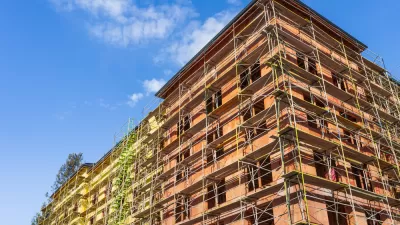There are two fundamental flaws with the emergent "YIMBY" approach to planning and development politics, according to this article in an influential magazine of the American left.
Karen Narefsky writes for the socialist publication Jacobin in an article that's generated a lot of discussion.
Narefsky's subject: a critique from the left of the movement known as YIMBY—the pro-development approach to the housing crisis afflicting many U.S. cities. After explaining YIMBYism and providing examples of YIMBY political action, Narefsky argues that the YIMBYframework has two fundamental flaws:
First, by positioning themselves as NIMBYs’ virtuous foils, YIMBYs paint all critics of development as entitled, self-interested actors who have no concern for the greater good — ignoring the fact that it is quite possible to be skeptical of a development for reasons other than personal greed.
Narefsky reminds the reader that developers are only beholden to investors, not the communities where they build. This flaw echoes a similar argument about communitarian interests written by Lisa Schweitzer in September 2016.
But the second flaw is more important to Narefsky:
The second, and more important, problem with YIMBYism is that it is based on an embrace of the speculative housing market. It assumes that the cause of the housing crisis is a dearth of supply, and that the market will address the crisis if restrictions are lifted.
Narefsky writes that land prices will never drop enough to bring the cost of housing within the reach of most working people. Moreover, the idea that today's luxury units might some day become affordable for a wide swath of the population (an idea most recently explained by Joe Cortright) ignores the reality of the contemporary real estate market: "Existing housing is more likely to be turned into short-term rentals through Airbnb, flipped to a condo developer, or turned into a high-end rental than it is to be occupied by a low-income family."
To conclude, Narefesky proposes an alternative schema to evaluate development proposals and planning visions, discarding the false choice between NIMBY and YIMBY.
FULL STORY: What’s In My Backyard?

Alabama: Trump Terminates Settlements for Black Communities Harmed By Raw Sewage
Trump deemed the landmark civil rights agreement “illegal DEI and environmental justice policy.”

Study: Maui’s Plan to Convert Vacation Rentals to Long-Term Housing Could Cause Nearly $1 Billion Economic Loss
The plan would reduce visitor accommodation by 25% resulting in 1,900 jobs lost.

Planetizen Federal Action Tracker
A weekly monitor of how Trump’s orders and actions are impacting planners and planning in America.

Wind Energy on the Rise Despite Federal Policy Reversal
The Trump administration is revoking federal support for renewable energy, but demand for new projects continues unabated.

Passengers Flock to Caltrain After Electrification
The new electric trains are running faster and more reliably, leading to strong ridership growth on the Bay Area rail system.

Texas Churches Rally Behind ‘Yes in God’s Back Yard’ Legislation
Religious leaders want the state to reduce zoning regulations to streamline leasing church-owned land to housing developers.
Urban Design for Planners 1: Software Tools
This six-course series explores essential urban design concepts using open source software and equips planners with the tools they need to participate fully in the urban design process.
Planning for Universal Design
Learn the tools for implementing Universal Design in planning regulations.
Caltrans
Smith Gee Studio
Institute for Housing and Urban Development Studies (IHS)
City of Grandview
Harvard GSD Executive Education
Toledo-Lucas County Plan Commissions
Salt Lake City
NYU Wagner Graduate School of Public Service





























